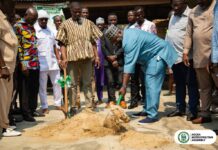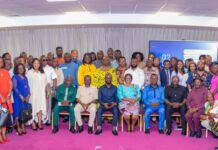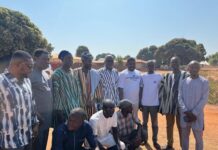In a revelation that casts a harsh spotlight on Ghana’s ongoing battle against illegal mining, known locally as galamsey, investigative journalist Erastus Asare Donkor affiliated with Multimedia recently exposed unsettling truths about the government’s insufficient approach to tackling this issue.
Through his meticulous research, which tragically resulted in his abduction and assault alongside his team, Erastus has revealed the ineffectiveness and systemic flaws within the very task forces assigned to curb galamsey operations.
Speaking candidly on Newsfile on Joy Prime monitored by MyNewsGH.com, Erastus explained that the government’s Special Task Force, established to address illegal mining, often serves more as a public relations strategy than a genuine enforcement body.
“The Task Force deployed to these sites is essentially performing for appearances, without any real decision-making power,” he stated.
According to Erastus, these units do not operate autonomously; rather, they rely heavily on instructions from higher-ups, whose directives largely dictate their schedules, areas of focus, and response to illegal mining activities.
His investigation revealed a concerning level of constraint placed upon Task Force members. Though made up of trained soldiers from diverse military units, these operatives are limited by the orders they receive from influential figures.
“They’re given specific areas to patrol, and they are explicitly instructed not to engage in arrests or interfere directly with the activities of illegal miners,” Erastus disclosed.
Despite the rampant pollution of rivers and forests due to galamsey, the Task Force remains largely idle, unable to carry out meaningful action. “It’s like they’re simply there to be seen,” he lamented, emphasizing the disconnect between their visible presence at these sites and their restricted capability to act.
In his critique, Erastus noted that the environmental toll of unchecked galamsey activities has reached alarming proportions. Rivers, essential for drinking water, are now heavily contaminated with toxic chemicals like mercury, which illegal miners use for gold extraction.
Vegetation and farmland in affected regions are also being destroyed, further threatening local agriculture and communities that rely on these resources for their livelihoods.
When asked why these soldiers, trained to uphold law and order, are effectively barred from intervening, Erastus suggested that the influence of powerful stakeholders complicates the situation.
“The higher authorities have vested interests, which likely explains why the Task Force is not allowed to interfere with the illegal miners’ work,” he said.
Through these unsettling insights, Erastus Asare Donkor’s account underscores the urgent need for reforms within Ghana’s anti-galamsey operations.
Source: Ghana Web











